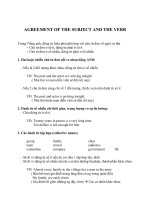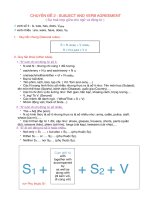sự hòa hợp chủ ngữ và động từ
Bạn đang xem bản rút gọn của tài liệu. Xem và tải ngay bản đầy đủ của tài liệu tại đây (64.17 KB, 2 trang )
S: Subject Sing: Singular unc. n.: Uncountable noun
V: Verb N: Noun Pro: Pronoun
Plu: Plural
I. GENERAL RULE
The elevator works very well. The elevators work very well.
1. Hai hay nhiều chủ từ số ít được nối bởi liên từ AND thì đòi hỏi một động số nhiều.
- The boy and the girl love their parents dearly.
- Tom and Mary were late yesterday.
2. Hai chủ từ được nối với nhau bằng AND mà trước chủ từ đầù có EACH, EVERY, MANY A, NO thì động
từ phải ở số ít.
- Each boy and girl has a textbook.
- No teacher and student is present.
3. Khi hai chủ từ được nối bởi OR, EITHER… OR, NEITHER…NOR… thì động từ hòa hợp cùng ngôi với
chủ từ gần nó nhất.
- He or you are the best student in this class.
- Neither Jack nor I am willing to do that.
4. Khi hai chủ từ được nối bởi AS WELL AS, ACCOMPANIED BY, WITH…. thì động từ hòa hợp với chủ từ
thứ nhất.
- John, as well as you, is responsible for this act.
- Tom, with his friends, is in the car.
5. Khi chủ từ là danh từ có hình thức là số nhiều nhưng nghóa lại là số ít thì động từ chia ở số ít.
- No news is good news.
- Physics is more difficult than chemistry.
Các danh từ thường gặp như : - Subjects: mathematics, physics…………………
- Diseases: measles, mumps………………………
- Nations: the Phillippines, the United States………………………
- Other Nouns: news, goods
6. Khi chủ từ là danh từ chỉ trọng lượng, đo lường, giá cả hay giá tiền thì được coi là số ít, động từ theo sau
cũng ở số ít.
- Ten thousand dollars is a big sum of money.
- Five hundred miles is a long distance.
7. Khi chủ từ là đại từ bất đònh như : everyone, something, nobody…thì động từ theo sau phải ở số ít.
- Nobody has opened the door.
- Is everyone present ?
8. Trong câu bắt đầu bằng THERE thì động từ hòa hợp với chủ từ theo sau nó.
- There is a pagoda facing the little lake.
- There were a lot of people at the meeting.
9. Động từ có chủ từ là đại từ quan hệ thì phải hòa hợp cùng ngôi và số danh từ đứng trước nó
- He works for the factory which makes cars.
- The man who is living near my house teaches us English.
10. A number of + Noun + V
plu
The number of + Noun + V
sing
- A number of students b are going to the class picnic.
- The number of students in this class is 45.
11. Khi phân số đứng trước danh từ số ít động từ số ít, trước danh từ số nhiều động từ số nhiều.
- 60 % of waste water is recycle.
- Half of the students in this school come from the country.
12. Một vài danh từ luôn ở hình thức số nhiều: scissors, shorts, pants, jeans, trousers, eyeglasses.
- The pants are in the drawer.
S
sing
+ V
sing
S
plu
+ V
plu
13. Một số danh từ có hình thức số ít nhưng nghóa số nhiều, động từ ở hình thức số nhiều: people, police,
cattle, men, women, children, oxen, teeth, geese.
- Nowadays, women have more freedom.
14. The + tính từ, động từ ở số nhiều
- The disabled need help from the community.
15. None of/ No + NOUN
sing
+ V
sing
None of/ No + NOUN
plu
+ V
plu
-None of the money has been found.
- None of the students have finished the exam yet.
- No example is relevant to this case.
- No examples are relevant to this case.
16. Khi chủ từ là một mệnh đề động từ số ít
- That she had married 10 times before is obvious.
EXERCISE
Choose the correct form of the verb in the following sentences.
1. Neither Bill nor Mary (is/are) going to the play tonight.
2. Anything (is/are) better than going to another movie tonight.
3. Skating (is/are) becoming more and more popular everyday.
4. A number of reporters (was/were) at the conference yesterday.
5. Everybody who (has/have) a fever must go home immediately.
6. John, along with twenty friends, (is/are) planning a party.
7. The picture of the soldiers (Bring/brings) back many memories.
8. The quality of these recordings (is/are) not very good.
9. If the duties of these officers (isn’t/aren’t) reduced, there will not be enough time to finish the project.
10. The effects of cigarette smoking (have/has) been proven to be extremely harmful.
11. Your glasses (was/were) on the bureau last night.
12. There (was/were) some people at the meeting last night.
13. The committee (has/have) already reached a decision.
14. A pair of jeans (was/were) in the washing machine this morning.
15. Each student (has/have) answered the first three questions.
16. The use of credit cards in place of cash (have/has) increased rapidly in recent years.
17. Advertisements on television (is/are) becoming more competitive than ever before.
18. Mr. Jones, accompanied by members of the committee, (have/has) proposed some changes of the rules.
19. Living expenses in this country, as well as in many others, (is/are) at an all-time high.
20. The levels of intoxication (vary/varies) from subject to subject.
21. Either John or his wife (make/makes) break breakfast each morning.
22. After she had perused the material, the secretary decided that everything (was/were) in order.
23. The crowd at the basketball game (was/were) wild with excitement.
24. A pack of wild dogs (has/have) frightened all the ducks away.
25. Neither the moon nor stars (is/ are) visible in this dark night.
26. The English (is/ are) proud and independent people.
27. Cattle (is/ are) raised in all farms in the country.
28. None of the girls in this school (wears/ wears) white shirts.
29. The United Nations (has/ have) its head quarters in New York City.
30. Half of the flowers in her garden (is/ are) in red colour.
31. What he said (was/ were) unreliable.
32. Measles (is/are) cured without much difficulty nowadays.
33. Two years (is/are) a long time to wait.
34. The number of pupils getting poor marks since the beginning of the semester (is/ are) appalling.
35. Every boy and girl in this room (knows/ know) the answer.
36. Three kilos of potatoes (makes/ make) the basket heavier.
37. I myself as well as James ________ gone to the party.
38. Both of the girls (is/ are) pretty but neither of them is intelligent.
39. Some of the tables in the classroom (was/ were) broken.
40. There (was/ were) only some water in the bottle.

![[TieuBaoan] Verb and Subject Agreement....Sự hòa hợp giữa chủ ngữ và động từ](https://media.store123doc.com/images/document/13/gu/cp/medium_kVMDEAPdC0.jpg)







